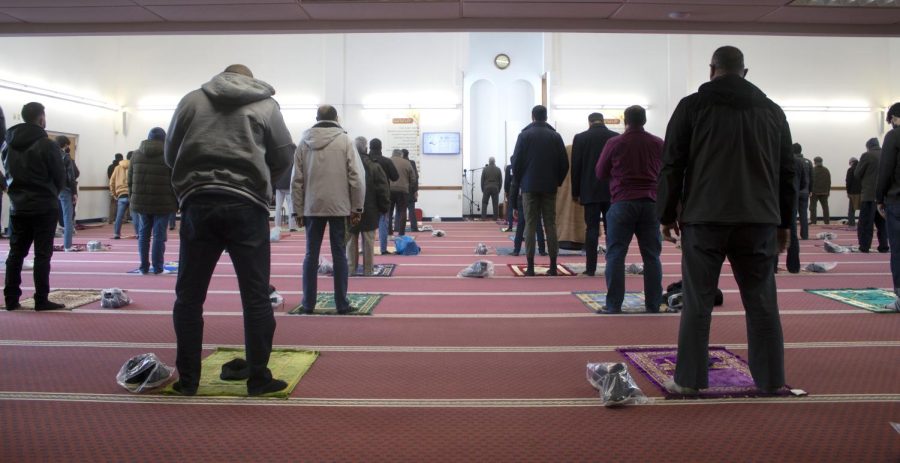Islamic Society of Akron and Kent remains open for prayer, keeps events virtual
February 25, 2021
Editor’s note: This is the third of a five-part series that looks at how local places of worship are handling the pandemic. Part one, part two and part four can be found here.
Touch is an essential part of Friday prayer for Muslims, but for Khalid Madhi, a congregant at the Islamic Society of Akron and Kent, when he participates in Friday prayer it is not shoulder to shoulder with his brothers at his mosque.
Madhi, like many other Muslims, made the shift to praying at home due to safety concerns with the pandemic.
The Islamic Society of Akron and Kent, a mosque located in Cuyahoga Falls, works very closely with Kent State and its students. Lydia Rose is a Professor of Sociology at Kent State as well as the Director of Public Relations at the Islamic Society of Akron and Kent. This relationship with Kent State gave the society an initial template of how to steer the uncharted territory of COVID-19.
“[When Kent State shut down] We initially were thinking we could still meet on-site, but we should use some safety protocols like sanitation,” Rose said. “Within a day, we decided no, we need to shut everything down.”
On March 12 of last year, the Islamic Society made the decision to stop all on-site services at the mosque.
“For some people, it was incomprehensible that we were shutting down the mosque because that’s never been done before,” Rose said.
For the first time ever, the mosque was shut down for on-site prayer. According to whyislam, Friday prayer is an obligation for men of age. When this on-site obligation came to a halt, members were confused and distressed.
Rose said they would do their prayers at home and the Imans, Islam prayer leaders at the congregation, would perform a live service on Facebook and Youtube.
Madhi and Rose said Muslims pray shoulder to shoulder during Friday prayer because of the spiritual meaning it holds for them.
“It represents that we are united in worship,” Madhi said. “It’s a physical closeness that we hope translates into a spiritual closeness.”
Madhi also said this lack of physical touch has been the hardest part of virtual prayer.
In April of 2020, the congregates of the Islamic Society experienced their holiest month, Ramadan, completely virtual. Rose said Ramadan is a month of fasting that opens up into celebration.
“If you had a small family, it was very isolating,” Rose said. “When you open your fast, that’s when it’s a celebration … [Pre-COVID] families would come together and you’d pray together, you’d eat together, you’d do activities together.”
To help its members and their families feel more connected, the society provided Quran readings all month via Facebook. They also created a drive through celebration at the end of Ramadan where members decorated their cars and drove through to different stations where they could pick up flowers, gifts and food.
When summer came around, the Islamic Society’s leadership team decided to start holding Friday prayer services in their outside pavilion. Rose said it was their attempt at getting people back together for Friday prayer and even though members were worshipping together, they had to stay six feet apart.
As the months started to get colder, the society used its task force to provide insight on what steps should be taken next. This task force was made up of 14 health-care professionals and leadership at the Islamic Society that shared advice and updates on the pandemic.
With their help, the Islamic Society decided to try hosting daily prayers in the hallway. During these daily prayers, members had to practice all necessary safety precautions including standing six feet apart, wearing masks and temperature checks. When these trials showed success, the mosque was opened up for Friday prayer services.
For the in-person services being offered, anyone who attends is required to wear a mask, bring their own prayer rug, take a temperature check and maintain distance from others attending the service.
Moving forward, the Islamic Society plans to continue to open its mosque for prayer and services, but events will remain limited for safety.
Most events such as Jewish Muslim dialogue, fundraisers and coffee hour, where members discuss relevant topics such as racism, are held virtually.
The Islamic Society’s leadership team continues to read newsletters and attend governor meetings to educate themselves on the best response.
“We still don’t have this pandemic under control yet,” Rose said. “Even though we know that we can do social distancing, it just takes one little mistake.”
Hannah Mayer covers religion. Contact her at [email protected].
Editor’s Note: This story has been updated to reflect the fact some people are participating in Friday prayer from their homes.

























